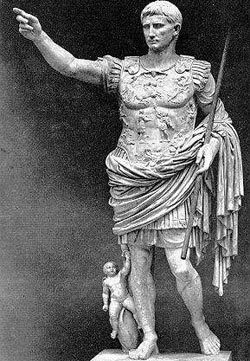Read Part 1 >>
Read Part 2 >>
The sexual debauchery of the Romans reached its peak through the figure of a famous character of that time: Empress Theodora. From a theatrical actress who performed in the nude, Theodora rose to nobility, becoming a powerful and lascivious queen.
The historian Procopius (499 – 565), in his *Secret History*, wrote about this renowned woman as follows: “In Byzantium, there was a man named Akamas, who managed the animals in the arena. Though strong as a bear, during the reign of Anastasius, he fell ill and died, leaving behind three daughters: Komith, Theodora, and Anastasia, the eldest being only 7. The wife remarried. As they grew up, all three daughters were very beautiful and were allowed by their mother to perform on stage. Lacking professional training in dance, Theodora could only rely on her beauty and youth to captivate audiences. In many plays, she agreed to perform nude naturally. As a result, at the lavish banquets of noble families, Theodora was invited to perform as a striptease dancer…”.
Thanks to her beauty and promiscuity, Theodora quickly became famous and became the mistress of the Byzantine emperor. After being “promoted” to nobility, Theodora married Roman Emperor Justinian. At that time, she was only 16 years old. Theodora co-ruled with Justinian as empress. She was recognized as a powerful and passionate queen. Although historians did not hesitate to comment on her lasciviousness, they also had to acknowledge Theodora’s capabilities in assisting Justinian.
 |
|
Emperor Augustus (Source: unf) |
Thus, in their romantic lives, the Romans greatly valued and celebrated pleasure. However, they neglected an important duty: “maintaining the lineage.” One of the reasons that led to the decline of Rome was the significant decrease in population. Therefore, from 18 BC to 9 BC, Emperor Augustus (63 BC – 14 AD) had to issue new laws requiring widows to remarry within two years of their husband’s death. Anyone who divorced was required to remarry within 18 months. Unmarried men could not inherit property. Couples without children could only inherit half of their parent’s estate. The new law was also more liberal, allowing people from different social classes to marry. Freedmen and former slaves could also become spouses. Moreover, those with many children would be rewarded.
However, Augustus’s laws did not achieve the desired effect because hedonism had deeply rooted itself in Roman life. Many feared having children and resorted to contraception. Additionally, the decline in the Roman population had another fundamental cause: the vast majority of Roman men lost their ability to father children, and women suffered from infertility. Three main reasons can be identified:
First, excessive drinking. Alcohol can stimulate sexual desire but suppress reproductive ability. A recent study found that among 14,000 heavy alcoholics, as many as 1,400 were completely unable to conceive. The Romans were famously known as a “drunken and pleasure-seeking” people, with many men accustomed to drinking in public baths from noon the previous day until the next day.
Second, excessive bathing. Roman public baths were not merely places for bathing but also social spaces. Roman men often frequented these venues daily, sometimes bathing for half a day or even a full day. Research indicates that prolonged immersion in hot water limits sperm production, affecting fertility. The normal temperature of the testes is lower than the body temperature and other parts, while the water temperature in Roman baths was consistently around 43 degrees Celsius, impacting the testes and leading to many cases of male infertility.
Third, chronic lead poisoning. According to a study by an American sociologist, Romans suffered from this poisoning, which rendered men infertile while women often experienced miscarriages or stillbirths. This was due to their frequent use of lead pipes, cups, and cookware. Women also used excessive amounts of lead-based cosmetics, making them highly susceptible to poisoning.
In the end, due to prolonged immersion in hot water and lead poisoning, the Roman population significantly declined. Furthermore, their excessive indulgence in sexual matters completely drained their vigor and courage. Ultimately, their military strength weakened, and the Roman Empire was quickly destroyed.


















































